Can Vegetarians Eat Seafood?
From Pescatarian to Vegan: Unraveling Seafood's Secrets and Saving Our Seas
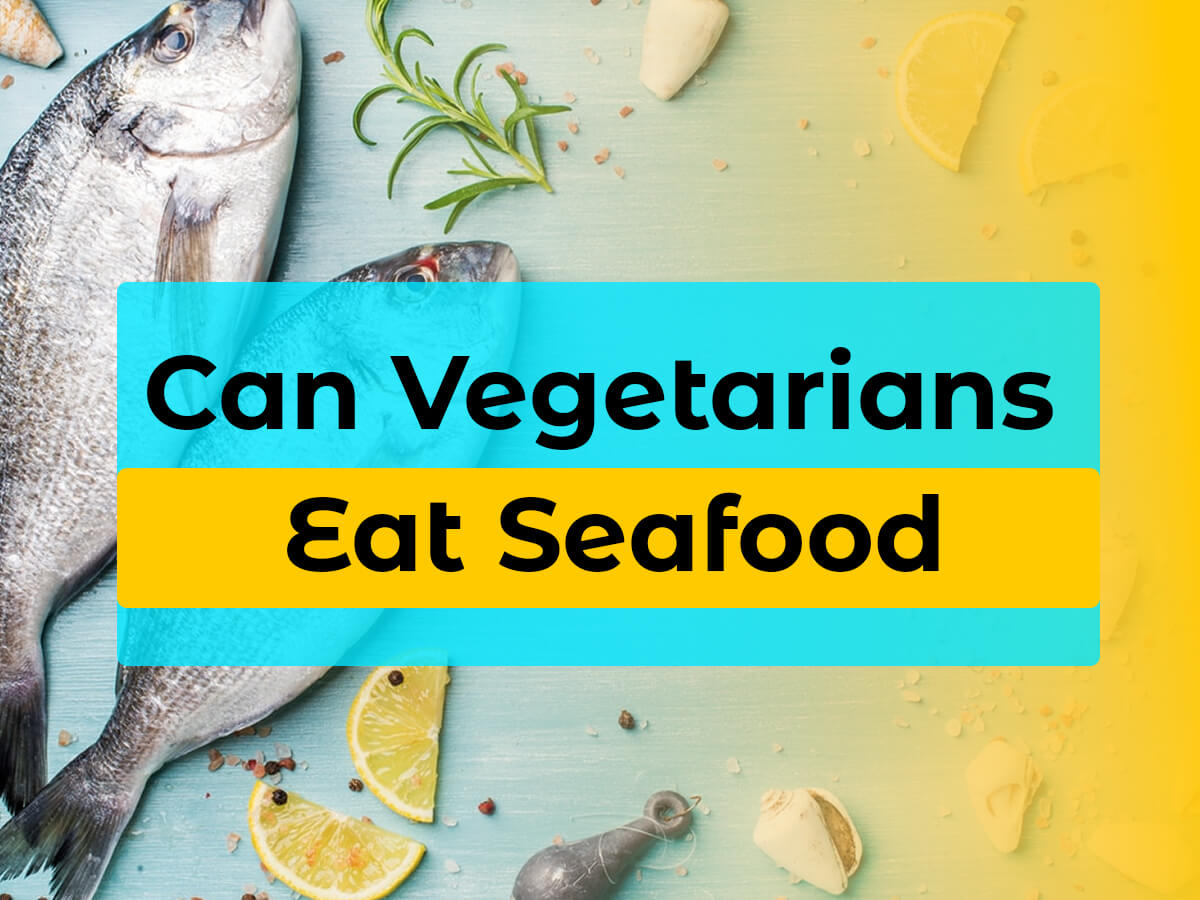
Hey there! I’m excited to share my personal journey as a vegan and delve into the intriguing topic of whether vegetarians can eat seafood.
When I embarked on my vegan journey, I quickly realized that the world of vegetarianism is vast and diverse. It’s like a treasure trove of different dietary choices, each with its own unique flavor and philosophy.
Everyone has their own reasons for following this diet and changing their lifestyle; some choose vegetarianism for their health and fitness; some choose vegetarianism because of restrictions and disease treatment; and vegans choose this diet and lifestyle for ethical, health, and environmental reasons.
Among the vegetarian diets, a particular type of vegetarianism is known as pest eaters or pescatarian.
This group avoids eating meat and chicken, but they have seafood, shellfish, fish, etc., in their diet.
In this article, I will explain more about vegetarians and seafood and will examine the reasons for their food choices. Then I will address the issue of how eating seafood by us humans has an effect on the environment. I will also explain the health and ethical aspects of this issue. I help you better understand this topic and make it easier to decide whether or not to eat seafood.
So grab a cup of tea, get cozy, and let’s unravel the seafood dilemma for vegetarian diets together!
In this article you will read:
Exploring Types of Vegetarian Diets:
Let’s dive into the exciting world of vegetarian diets and explore the different types people embrace. Each diet has its own prohibitions
From lacto-vegetarian to pescatarian, there’s a wide range of dietary choices. So, without further ado, here’s a breakdown of some popular vegetarian diets:
Different types of vegetarians include:
- Lacto-ovo vegetarianism is the most common type of vegetarianism, which involves avoiding meat, poultry, and fish, but still consuming dairy products (Lacto) and eggs (ovo).
- Lacto-vegetarian: This type of vegetarianism involves avoiding meat, poultry, fish, and eggs but consuming dairy products.
- Ovo-vegetarian: Similar to Lacto-vegetarian, they avoid eating meat, poultry, and fish, and instead of dairy products, they consume eggs.
- Vegan: Vegans avoid all animal products, including meat, poultry, fish, dairy, eggs, and even honey. Their diet is based on nuts, fruits, herbs, seeds, grains, breads, and pasta.
- Raw veganism involves consuming only raw, uncooked foods, such as fruits, vegetables, nuts, and seeds.
- Fruitarian: This type of vegetarianism involves consuming only fruits, nuts, seeds, and other plant-based foods that can be harvested without harming the plant.
- Flexitarian: This semi-vegetarian diet involves occasionally consuming meat, poultry, or fish but primarily plant-based foods.
- Pescatarinaism: As vegetarians, they don’t eat animal products, but they have seafood In their diary.
If you eat just seafood plates, I recommend reading the following to tell you what pescatarianism means!
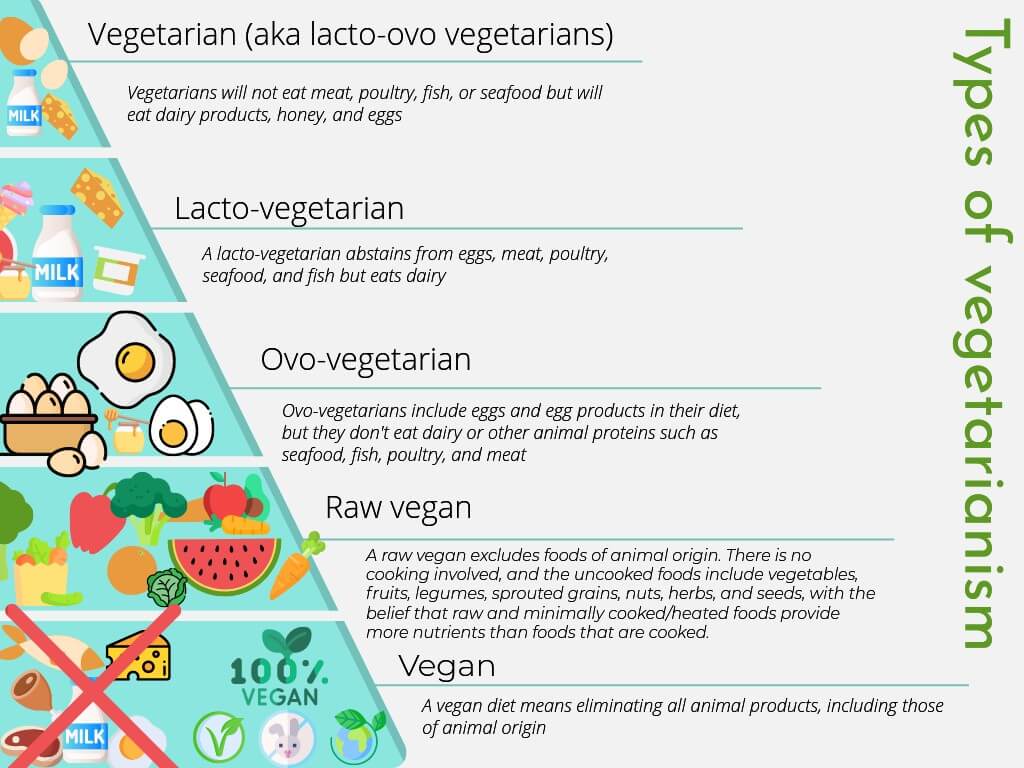
What is a pescatarian & what do they eat?
As someone who’s dabbled in this dietary approach, I can tell you what it entails and what pescatarians typically eat.
Let’s talk about pescatarians and what’s on their plate. A pescatarian is someone who follows a diet that includes fish and seafood, along with plant-based foods. They’re like the cool cousins of vegetarians!
So, they don’t eat meat, poultry, or other animal flesh but consume fish and shellfish.
They enjoy a variety of fruits, vegetables, grains, legumes, and plant-based goodness just like us vegans, but still, they also include fish and seafood in their meals.
Pescatarians can also incorporate protein sources, like tofu, tempeh, and legumes. Of course, as with any dietary approach.
But why do people choose this diet, you ask? Well, for some, it’s a way to embrace a healthier lifestyle by getting essential nutrients found in fish. Others may be drawn to seafood’s incredible flavors and culinary possibilities. Plus, being a pescatarian allows individuals to make ethical and environmental choices by reducing their meat consumption while still enjoying the taste of the sea. It’s all about finding a balance that works for them and aligns with their values.
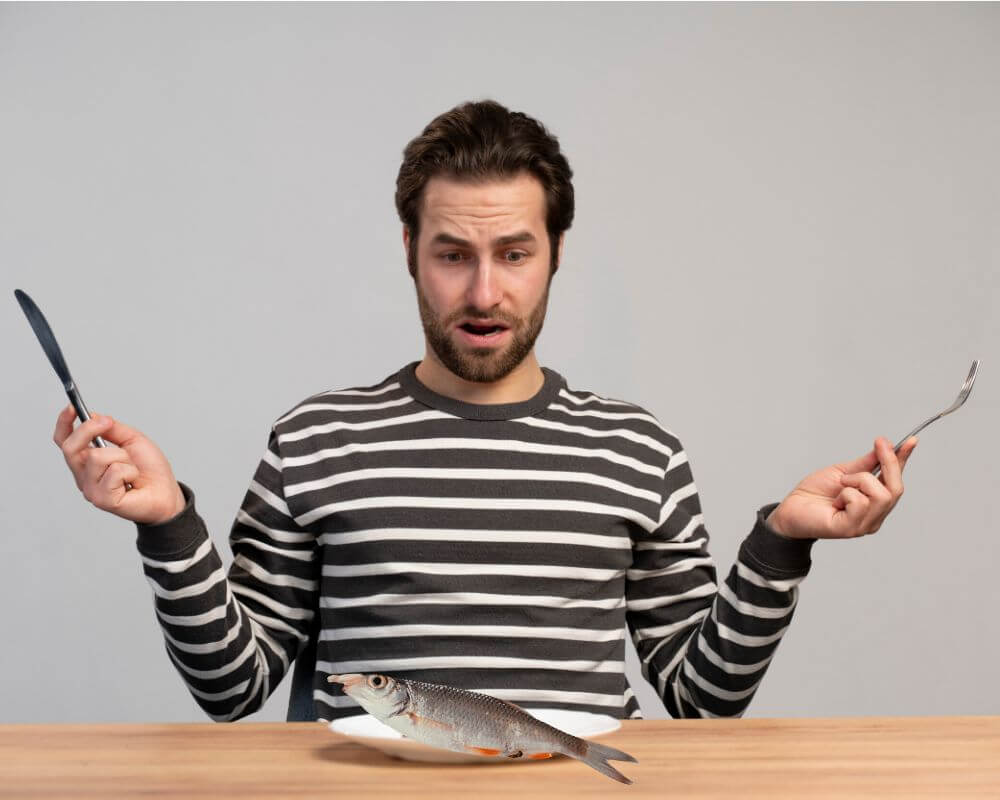
Is Pescatarian a good choice or not?
I totally get why some people are tempted by the pescatarian diet, but let’s weigh the pros and cons.
Studies have shown that a pescatarian diet may lower the risk of chronic diseases like heart disease, stroke, and certain cancers compared to a diet heavy in red and processed meats.
It can also help with weight management and maintaining a healthy body weight when combined with plant-based foods and lean protein sources. However, when we dive deeper, there are a few drawbacks:
- Firstly, consuming fish comes with the risk of exposure to mercury and other harmful contaminants that can be present in the water and atmosphere. Large species such as sharks, swordfish, king mackerel, and tilefish contain large amounts of mercury and can jeopardize human health.
- Additionally, if you have food or seafood allergies, a pescatarian diet may not be recommended for you.
- Moreover, there are significant environmental concerns associated with relying heavily on seafood. Overfishing and disrupting marine ecosystems can lead to a decline in biodiversity and an imbalance in the food chain.
So, my suggestion? Let’s explore plant-based alternatives for seafood that are both ethical and environmentally friendly.
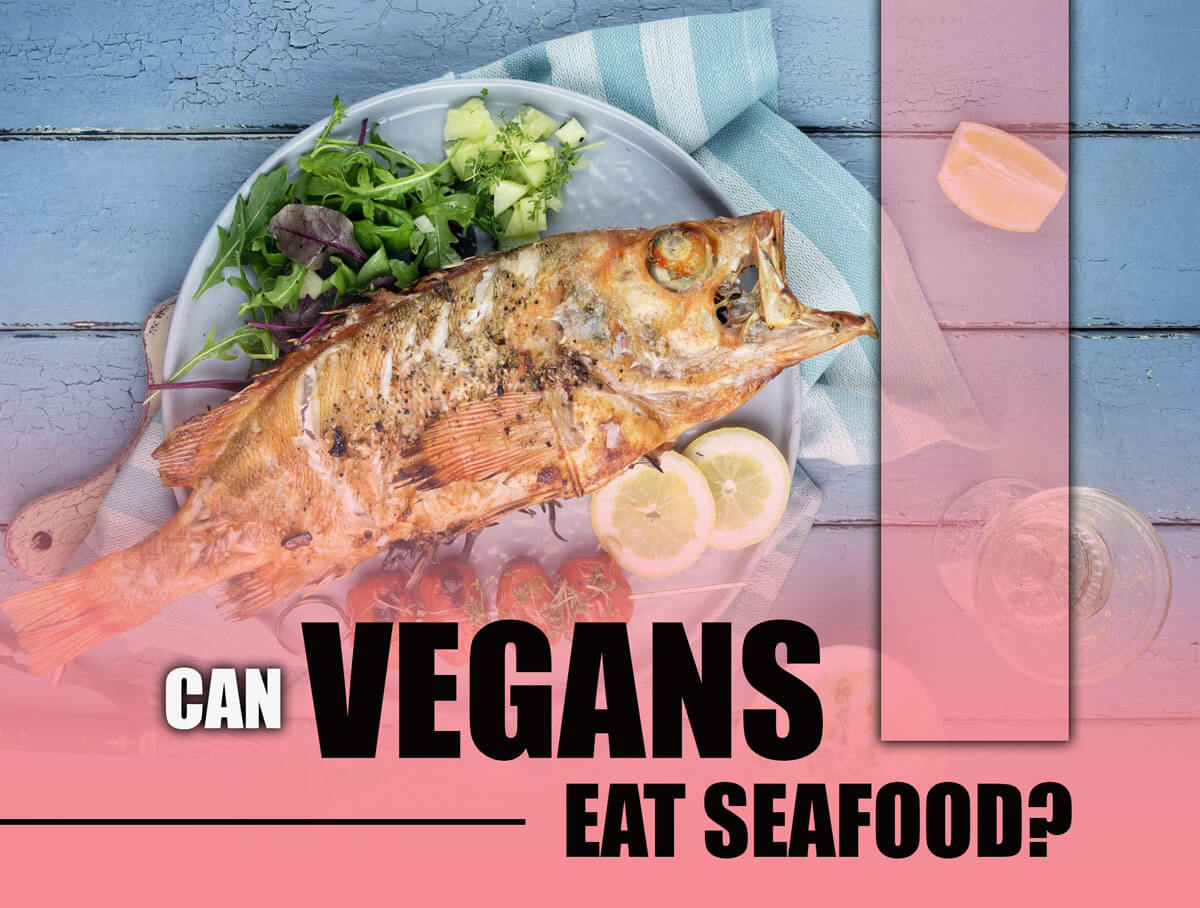
Reasons Not to Eat Seafood as a Vegan:
Let’s dive deep into the reasons why we vegans steer clear of seafood.
As a vegan, my decision to abstain from seafood stems from a solid commitment to core principles and ethics that guide my lifestyle.
Veganism is not just about what we put on our plates; it’s a compassionate and mindful way of living that extends to all aspects of life. I prioritize kindness and respect for all sentient beings by choosing plant-based foods.
Curious about the fishy world of veganism? Discover the surprising answer to the question: Do vegans eat fish? Dive into the depths of plant-based principles and seafood alternatives in this eye-opening blog post.
 Core Principles and Ethics of Veganism
Core Principles and Ethics of Veganism
Being vegan is all about embracing a lifestyle that aims to minimize living things’ harm. We believe in treating all creatures with compassion and respect, including those swimming beneath the surface.
Seafood, unfortunately, doesn’t align with these principles.
Seafood comes from animal sources, and as vegans, we strive to find plant-based alternatives for our nourishment.
 The distinction between plant-based and animal-based sources of food
The distinction between plant-based and animal-based sources of food
One of the critical distinctions between plant-based and animal-based food sources is the undeniable fact that seafood comes from animals.
The distinction becomes quite clear when we talk about plant-based versus animal-based food sources. Plants offer an abundance of nutrients and sustenance without the need for animal exploitation.
By focusing on plant-based options, we can meet our nutritional needs while reducing our impact on animals and the environment.
As a vegan, I choose to nourish my body with the plant kingdom’s abundance, embracing the incredible variety and health benefits of fruits, vegetables, grains, legumes, and nuts.
I believe animals can feel pain and suffering, and I don’t want to contribute to an industry that harms them.
 Environmental Impact of seafood production and Overfishing
Environmental Impact of seafood production and Overfishing
Beyond the personal impact, seafood production has a significant environmental toll. Overfishing and destructive fishing practices deplete our oceans, disrupt delicate ecosystems, and threaten marine biodiversity. The effects ripple throughout the food chain, affecting fish populations, other aquatic creatures, and their habitats.
By abstaining from seafood, I contribute to the preservation of our fragile marine ecosystems and help reduce the strain on our oceans.
Another alarming consequence of seafood production is bycatch—the incidental capture of non-target species during fishing. Countless marine animals, including dolphins, sea turtles, and seabirds, fall victim to this collateral damage. Additionally, destructive fishing practices such as bottom trawling destroy vital marine habitats, further exacerbating ocean biodiversity loss.
By refraining from seafood, I play my part in reducing the demand for these destructive practices and promoting a more sustainable future.
 Health risks of consuming seafood
Health risks of consuming seafood
Consuming seafood comes with potential health risks. Mercury contamination, microplastics, and antibiotics are too common in our oceans today. Mercury, a toxic heavy metal, can accumulate in fish and pose significant health risks, especially for pregnant women and children. Furthermore, the prevalence of microplastics in our oceans has led to their ingestion by marine life, which then makes its way onto our plates. Additionally, the widespread use of antibiotics in aquaculture contributes to the rise of antibiotic-resistant bacteria, posing a threat to public health.
By opting for plant-based alternatives, I can enjoy a diet free from these potential hazards and prioritize my well-being.
 Ethical Concerns and animal welfare issues in seafood production
Ethical Concerns and animal welfare issues in seafood production
Ethical considerations and animal welfare issues also significantly influence our decision to abstain from seafood. The fishing industry often involves inhumane practices, causing immense suffering to fish and other marine creatures. The conditions in which many sea creatures are captured, confined, and slaughtered are far from humane. From massive trawler nets to longlining, these methods harm the intended catch but also result in the loss of countless lives.
Fish, crabs, and other marine life can feel pain and suffering, and I do not want to contribute to an industry that harms them.
So, my friends, these are the reasons why we vegans choose to skip seafood. It combines ethical concerns, environmental impact, and health considerations. We believe in finding compassion on our plates and making choices that align with our values. By exploring the wealth of available plant-based alternatives, we can savor a diverse and satisfying vegan diet while creating a better world for animals and our planet.
it’s not about what we’re giving up, but It’s that we choose kindness over cruelty.
So, let’s keep exploring the vast array of plant-based options and embrace a lifestyle that aligns with our values and nourishes our bodies.
By understanding and embracing these reasons, I confidently choose to exclude seafood from my vegan diet.
It’s a decision that aligns with my values, promotes environmental sustainability, and prioritizes the well-being of all living beings, both on land and in the vast oceans that grace our planet.
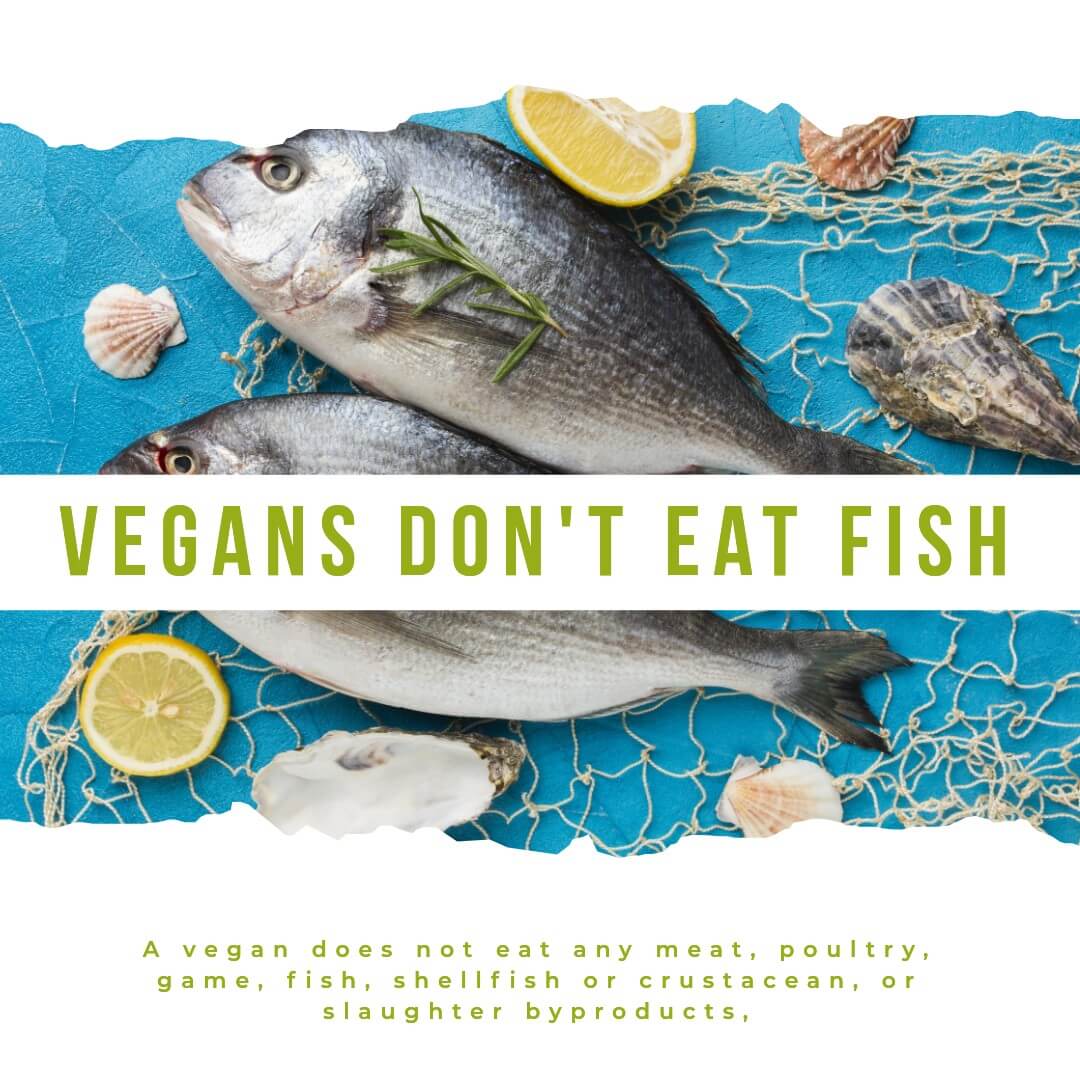
Ditching Seafood for Good: Nourishing Ourselves and Saving the Seas!
Let’s dive into the incredible world of plant-based nutrition. Forget about fishy omega-3 worries because we’ve got some amazing alternatives! Flaxseeds, chia seeds, and walnuts are our superhero sources of omega-3 fatty acids. Incorporating these power-packed ingredients into your daily meals can help ensure you get the nutrients your body needs.
Remember, a well-rounded plant-based diet that includes a variety of fruits, vegetables, whole grains, legumes, and nuts is key to meeting your nutritional needs as a vegan.
So, let’s talk about expanding our culinary horizons with some mind-blowing plant-based seafood alternatives : Foods High in Omega 3 for Vegetarians and Vegans
Vegetarian seafood substitutes
Who says vegans can’t enjoy the flavors and textures of seafood? The good news is, there’s an ever-growing variety of plant-based seafood substitutes that can elevate your culinary experience. From algae-based products that mimic the taste and texture of fish to mock fish made from soy or wheat protein, the options are expanding. Plant-based sushi is also gaining popularity, offering creative alternatives to traditional fish-based rolls. So, why not dive into these exciting alternatives and incorporate them into your vegan diet? You’ll be amazed at the creative possibilities and the delicious flavors that await you!
One popular option is plant-based “fish” products, which can be found in the freezer section of many grocery stores. These products are often made from soy or wheat protein and are designed to mimic the texture and flavor of fish. While they may not be an exact match for the real thing, they can be a tasty and satisfying substitute.
Another option is to get creative with plant-based ingredients and seasonings to create your own “seafood” dishes. For example, you could make a vegan “crab” cake using a combination of artichoke hearts and breadcrumbs or whip up a batch of “tuna” salad using mashed chickpeas and vegan mayo.
Mushrooms are another versatile ingredient that can be used to create seafood-like dishes. King oyster mushrooms, for example, have a chewy texture that can be sliced and prepared like scallops or calamari. In addition, portobello mushrooms can be marinated and grilled to make a delicious “fish” sandwich.

Engaging in Sustainable Seafood Practices: Advocating for Our Oceans and Our Future!
Now, let’s get serious about saving our beloved marine ecosystems. It’s time to advocate for sustainable fishing practices and support those incredible eco-certifications.
We have an opportunity to make a positive impact on our planet by supporting sustainable seafood practices. By encouraging responsible fishing practices and choosing eco-certified seafood options, we can help protect our precious marine ecosystems. Sustainable fishing methods such as line-caught or pole-caught can minimize bycatch and reduce harm to non-target species. It’s also essential to be aware of overfishing and choose seafood options that are not endangered or at risk. Together, we can advocate for a more sustainable and ethical approach to seafood consumption, preserving our oceans for future generations.
So, let’s embark on this journey together, discovering the world of plant-based seafood alternatives, nourishing our bodies with wholesome vegan nutrition, and making conscious choices that promote the well-being of marine life and our planet.
Remember, every bite we take can make a difference!
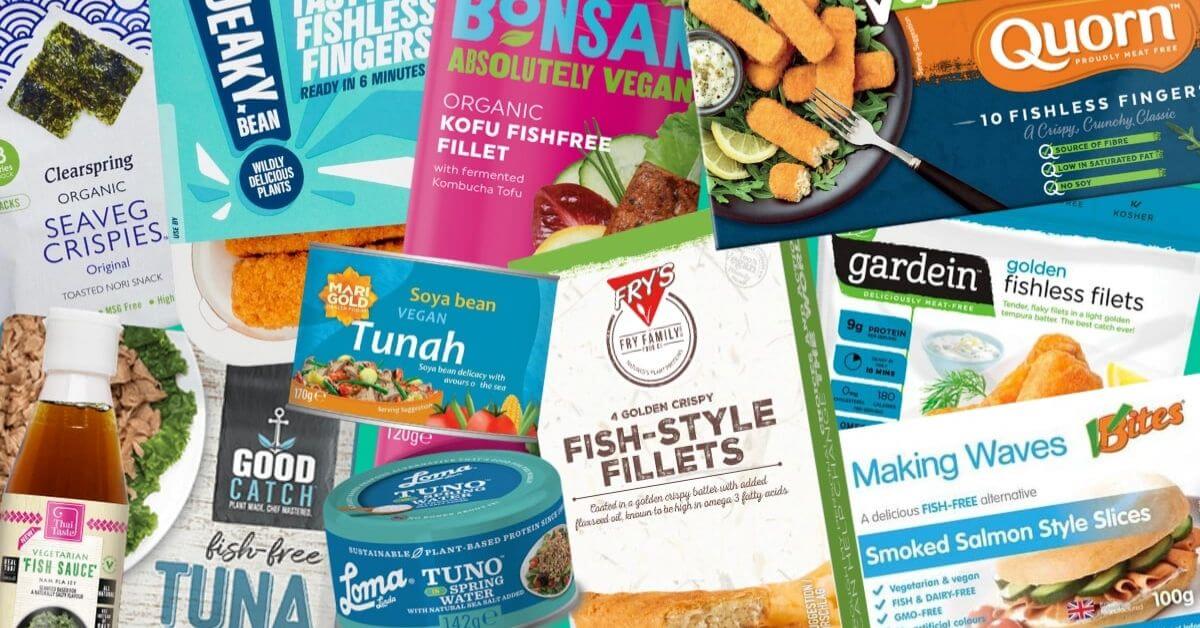
Vegetarian seafood brands
I am always looking for new vegetarian and vegan options and have been excited to see more vegetarian seafood brands on the market.
These brands offer a range of plant-based seafood substitutes that can be a great option for anyone looking to cut back on their consumption of animal products.
-
Gardein
One popular brand is Gardein, which offers a variety of plant-based “fish” products, including fishless filets, crab fewer cakes, and golden fishless filets.
These products are made from non-GMO soy and wheat protein and are designed to have a similar texture and flavor to real fish.
-
Sophie’s Kitchen
Another great option is Sophie’s Kitchen, which offers a range of vegan seafood substitutes, including “toona” (a plant-based tuna substitute), vegan shrimp, and vegan smoked salmon.
These products are made from ingredients like konjac root, seaweed, and soy protein and are designed to have a similar taste and texture to real seafood.
-
Good Catch
Other vegetarian seafood brands to check out include Good Catch, which offers plant-based tuna, crab cakes, and fish burgers, and Ocean Hugger Foods, which specializes in plant-based sushi substitutes like “ahimi” (a vegan substitute for tuna) and “sakimi” (a vegan substitute for salmon).

Let’s summary
We’ve reached the end of our journey into the intriguing topic of whether vegetarians can eat seafood. I’ve delved into the world of pescatarians, which include seafood in their otherwise meat-free diet, and we’ve examined the reasons behind their food choices.
While pescatarianism allows for the consumption of seafood, it’s important to consider the various aspects involved in this decision.From an ethical point of view, some people may question whether consuming seafood is compatible with vegetarian values. And the answer is that fish and other underwater creatures can understand the pain of fishing hooks and the suffering of suffocation caused by fishing nets.
In this article, I’ve discussed the ethical concerns, environmental impact, and potential health risks of consuming seafood.
As a vegan, I want to emphasize the importance of aligning our dietary choices with our core principles and values. That means embracing a compassionate and mindful way of living that extends to all sentient beings, including those in the oceans. That’s why I choose to exclude seafood from my diet. I don’t want to contribute to an industry that harms animals. Moreover, I want to play my part in reducing the strain on our oceans and promoting a compassionate and mindful way of living.
It’s not about what we’re giving up, but rather that we choose kindness over cruelty.
Whether you’re a vegetarian, pescatarian, or simply looking to incorporate more plant-based options into your diet, plenty of tasty and satisfying options are available.
I recommend trying some of the vegetarian seafood substitutes and brands mentioned in this essay and seeing how they work for you!
Now it’s your turn! I would love to hear your thoughts and experiences. Did this article resonate with you? Are you a vegetarian or considering incorporating more plant-based options into your diet? Let me know in the comments below. Your feedback and insights are invaluable to fostering a vibrant and supportive community.
Remember, it’s not about what we’re giving up; it’s about choosing kindness over cruelty and positively impacting our health, the environment, and the lives of animals. So, let’s continue exploring the world of plant-based options and create a better future together, one bite at a time.
Stay curious, stay compassionate, and keep spreading vegan love!
Comment below, and let’s keep the conversation going!


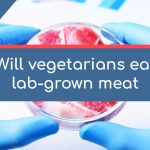

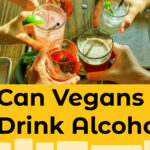

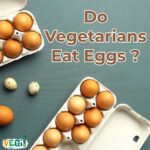


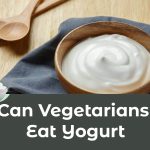

Itís nearly impossible to find well-informed people for this topic, but you seem like you know what youíre talking about! Thanks
Thanks so much for your kind words. 😄 It’s great to hear that our information is helpful. It’s always our goal to provide well-informed insights and help shed light on various topics. If you have any more questions or need further information, feel free to reach out. Happy to assist you!